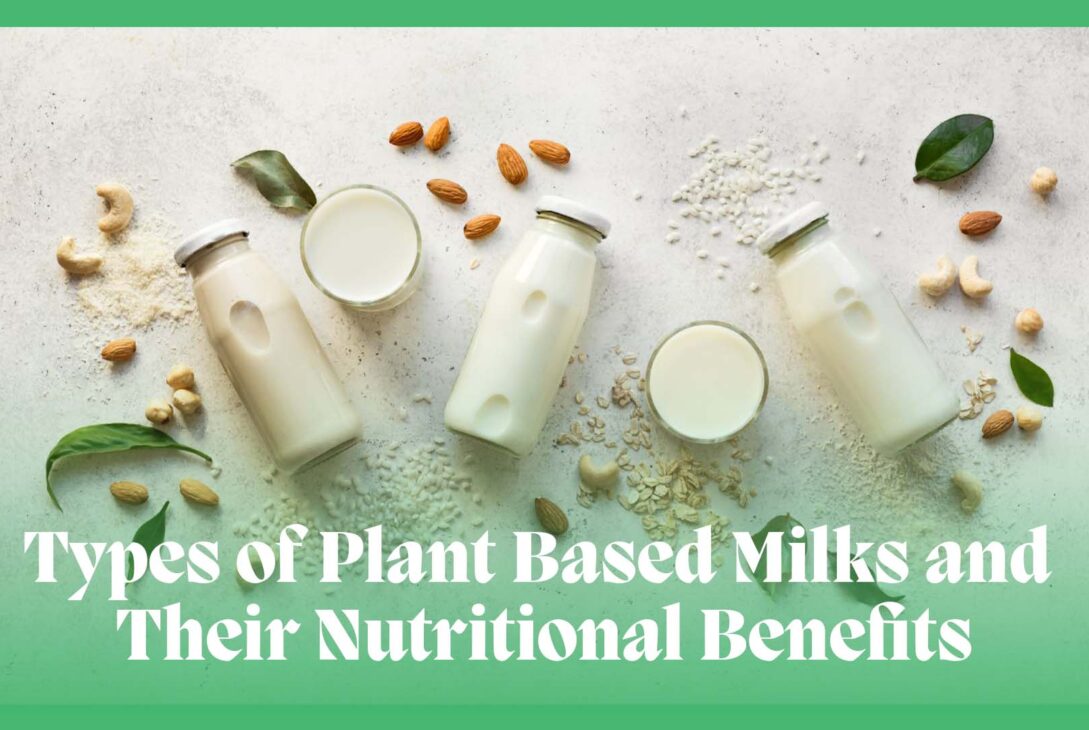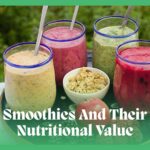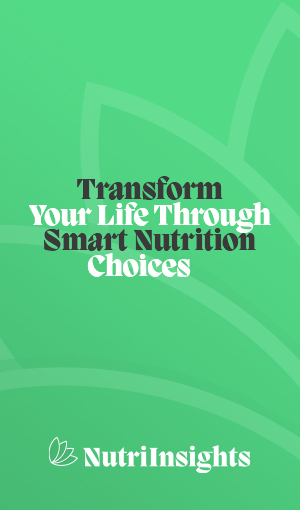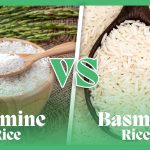Plant-based milk has become increasingly popular as an alternative to dairy milk due to its health benefits, dietary versatility, and lower environmental impact. This article explores the nutritional profiles, health benefits, and unique characteristics of various plant-based milks including almond, soy, oat, coconut, rice, cashew, hemp, flax, pea, macadamia, quinoa, walnut, hazelnut, pistachio, sunflower seed, pumpkin seed, sesame seed, tiger nut, spelt, and barley milk.
Almond Milk:
Almond milk, with its subtly nutty flavor and creamy texture, has been a staple in kitchens for centuries. Originally crafted in the Middle Ages, it served as a popular beverage during Lent when animal products were avoided. Today, almond milk remains a favorite for those seeking a delicious and versatile dairy alternative.
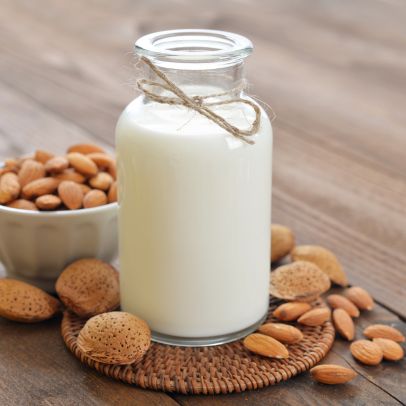
Nutritional Profile:
| Nutrient | Amount per Cup (240ml) |
|---|---|
| Calories | 30-50 kcal |
| Protein | 1 g |
| Fat | 2.5 g |
| Carbohydrates | 1 g |
| Fibre | 1 g |
| Calcium | 20-45% DV |
| Vitamin D | 25% DV |
| Vitamin E | 50% DV |
Role in human nutrition:
Weight Management:
Almond milk is low in calories, making it a popular choice for those looking to manage their weight.
Improves Skin Health:
It is rich in vitamin E, an antioxidant that supports skin health and immune function.
Good for Bone Health:
Additionally, almond milk is often fortified with calcium and vitamin D, which are essential for bone health (1).
Soy Milk:
Soy milk has a rich history that dates back to ancient China, where it was first developed over 2,000 years ago. Renowned for its creamy consistency and high protein content, soy milk has transcended its origins to become a global favorite, celebrated for its nutritional benefits and versatility in both sweet and savory dishes.
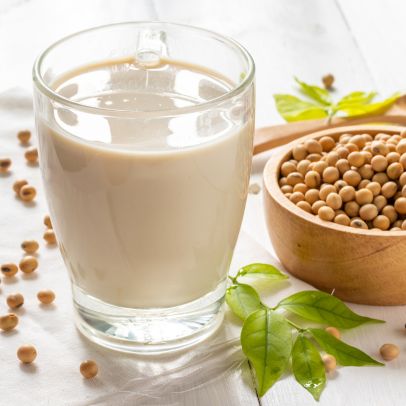
Nutritional Profile:
| Nutrient | Amount per Cup (240ml) |
|---|---|
| Calories | 80-100 kcal |
| Protein | 7 g |
| Fat | 4 g |
| Carbohydrates | 4 g |
| Fibre | 1-2 g |
| Calcium | 20-45% DV |
| Vitamin D | 30% DV |
| Vitamin B12 | 50% DV |
Role in human nutrition:
High Protein Content:
Soy milk is a high-protein option that can be beneficial for muscle maintenance and repair.
Aids in Heart Health:
It contains isoflavones, which have been linked to reduced risk of heart disease.
Improves Bone Health:
Soy milk is also a good source of vitamin B12, especially important for those following a vegan diet(2).
Coconut Milk:
Coconut milk has been a culinary cornerstone in tropical regions for millennia, prized for its rich, creamy texture and distinctive flavor. Used extensively in Southeast Asian and Caribbean cuisines, this versatile milk continues to enchant with its ability to enhance everything from curries to desserts.
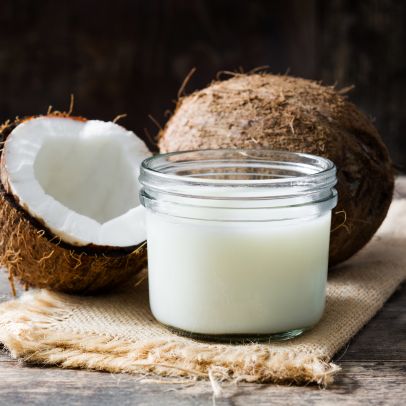
Nutritional Profile:
| Nutrient | Amount per Cup (240ml) |
|---|---|
| Calories | 50-80 kcal |
| Protein | 0.5g |
| Fat | 5g |
| Carbohydrates | 2g |
| Fibre | 0.1 g |
| Calcium | 10-30% DV |
| Vitamin D | 25%DV |
| Iron | 4% DV |
Role in human nutrition:
Metabolism Boost:
Coconut milk contains medium-chain triglycerides (MCTs), which are believed to aid in weight loss and metabolism (3).
Cooking Versatility:
Its creamy texture makes it a popular choice for cooking and baking.
Rice Milk:
Rice milk, a traditional beverage in East Asia, has been enjoyed for centuries for its mild flavor and light texture. Originally consumed by those with dairy allergies, it has evolved into a popular choice for anyone seeking a gentle, refreshing alternative to dairy milk.
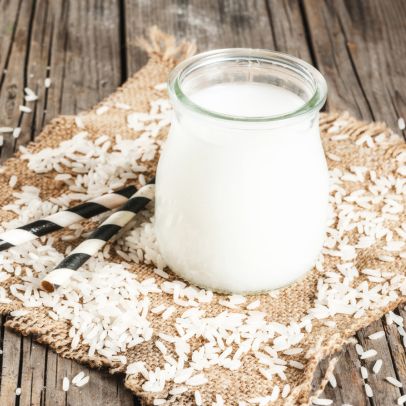
Nutritional Profile:
| Nutrient | Amount per Cup (240ml) |
|---|---|
| Calories | 120-140 kcal |
| Protein | 1g |
| Fat | 2.5g |
| Carbohydrates | 22g |
| Fibre | 0.5g |
| Calcium | 20-30% DV |
| Vitamin D | 25% DV |
| Iron | 2% DV |
Role in human nutrition:
Allergy-Friendly:
Rice milk is hypoallergenic, making it a suitable choice for individuals with allergies to dairy, soy, or nuts (4).
Oat Milk:
Oat milk is a modern sensation with roots in Sweden, where it was invented in the early 1990s. Its creamy texture and naturally sweet flavour quickly captured the hearts of many, making it a beloved addition to coffee shops and kitchens around the world, known for its smooth taste and eco-friendly production.
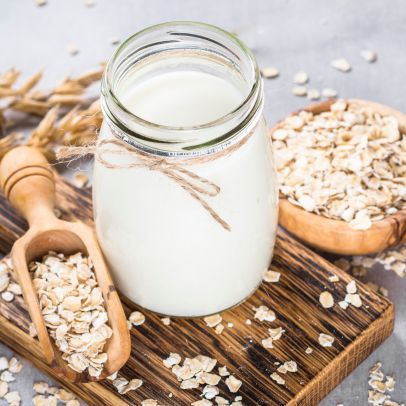
Nutritional Profile:
| Nutrient | Amount per Cup (240ml) |
|---|---|
| Calories | 120-130 kcal |
| Protein | 3-4g |
| Fat | 2.5g |
| Carbohydrates | 16-20g |
| Fibre | 2-4g |
| Calcium | 20-30% DV |
| Vitamin D | 25% DV |
| Iron | 10% DV |
Role in human nutrition:
Improves Digestive Health:
Oat milk is known for its high fiber content, which can help with digestive health.
Helps in Cholesterol Management:
It is also a good source of beta-glucans, which have been shown to lower cholesterol levels (5).
Cashew Milk:
Cashew milk, with its velvety smoothness and subtly nutty flavor, has its origins in traditional Indian and African cuisines. This luxurious milk has found its way into modern kitchens, offering a deliciously creamy option for those looking to elevate their culinary creations.
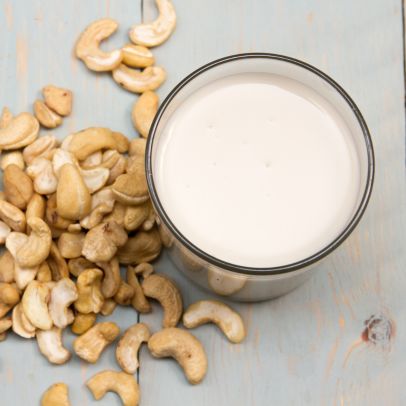
Nutritional Profile:
| Nutrient | Amount per Cup (240ml) |
|---|---|
| Calories | 25-50 kcal |
| Protein | 1g |
| Fat | 2g |
| Carbohydrates | 1-2g |
| Fibre | 0-1g |
| Calcium | 20-45% DV |
| Vitamin D | 25% DV |
| Vitamin E | 10% DV |
Role in human nutrition:
Aids in Weight Management:
Cashew milk is low in calories and fat, making it a good choice for those looking to manage their weight.
Improves Skin Health:
It also contains antioxidants that support immune function and skin health.
Hemp Milk:
Hemp milk, made from the seeds of the hemp plant, has a history steeped in ancient civilizations where hemp was valued for its versatile uses. Today, this creamy, nutty milk is celebrated for its sustainable production and unique taste, making it a trendy choice among eco-conscious consumers.

Nutritional Profile:
| Nutrient | Amount per Cup (240ml) |
|---|---|
| Calories | 60-80 kcal |
| Protein | 2-3 g |
| Fat | 5-6 g |
| Carbohydrates | 0-1 g |
| Fibre | 0-1 g |
| Calcium | 20-30% DV |
| Vitamin D | 25% DV |
| Iron | 2-4% DV |
Role in human nutrition:
Helps in Heart Health:
Hemp milk is rich in omega-3 and omega-6 fatty acids, which are beneficial for heart health (6).
Complete Protein:
It also contains all essential amino acids, making it a complete protein source.
Flax Milk:
Flax milk is a relative newcomer in the world of plant-based beverages, made from flax seeds known for their rich omega-3 content. Its smooth, mild flavor has quickly gained popularity, offering a nutritious and innovative option for those exploring dairy-free alternatives.
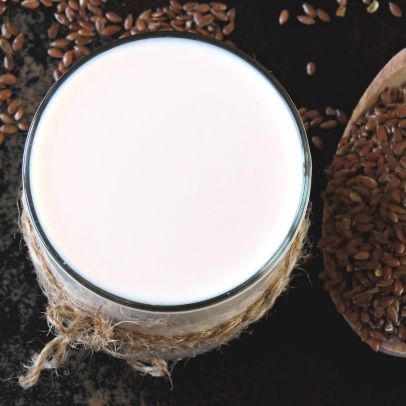
Nutritional Profile:
| Nutrient | Amount per Cup (240ml) |
|---|---|
| Calories | 25-50 kcal |
| Protein | 0-1g |
| Fat | 2.5 – 3.5 g |
| Carbohydrates | 0-1g |
| Fibre | 0-1g |
| Calcium | 20-30% DV |
| Vitamin D | 25% DV |
| Omega-3 Fatty Acids | 1200mg |
Role in human nutrition:
Anti-Inflammatory:
Flax milk is a rich source of omega-3 fatty acids, which are known for their anti-inflammatory properties (7).
Heart friendly:
Omega-3 fatty acids present in flax milk are also beneficial for heart health.
Pea Milk:
Pea milk, crafted from yellow peas, is a modern marvel in the plant-based milk industry. Known for its impressive protein content and creamy texture, this milk has rapidly become a favorite among those seeking a hearty, nutritious alternative to traditional dairy.
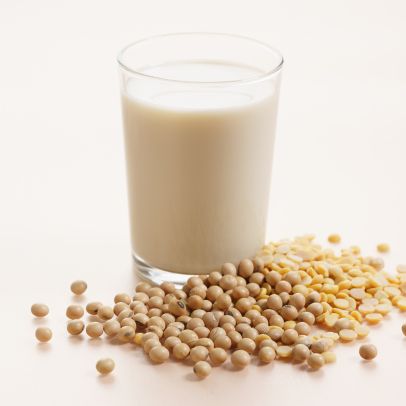
Nutritional Profile:
| Nutrient | Amount per Cup (240ml) |
|---|---|
| Calories | 70-80 kcal |
| Protein | 8 g |
| Fat | 4.5 g |
| Carbohydrates | 0-1 g |
| Fibre | 0-1 g |
| Calcium | 20-30% DV |
| Vitamin D | 25% DV |
| Iron | 2-4% DV |
Role in human nutrition:
High Protein Content:
Pea milk is high in protein, making it a great alternative for muscle repair and maintenance.
Supports Bone Health:
It is often fortified with calcium and vitamin D, supporting bone health (8).
Macadamia Milk:
Macadamia milk, derived from the buttery-rich macadamia nut native to Australia, offers a luxurious and smooth taste experience. This relatively new addition to the plant-based milk family has quickly gained fans for its decadent flavour and unique nutritional profile.
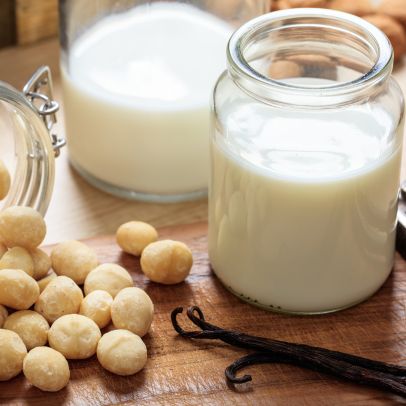
Nutritional Profile:
| Nutrient | Amount per Cup (240ml) |
|---|---|
| Calories | 50-70 kcal |
| Proteins | 1 g |
| Fat | 4-5 g |
| Carbohydrates | 1-2 g |
| Fibre | 0-1 g |
| Calcium | 20-30% DV |
| Vitamin D | 25% DV |
| Iron | 2-4% DV |
Role in human nutrition:
Improves Heart Health:
Macadamia milk is rich in monounsaturated fats, which are beneficial for heart health (9).
Supports overall health:
It contains antioxidants that support overall health.
Quinoa Milk:
Quinoa milk, made from the ancient grain revered by the Incas, offers a unique, slightly nutty flavor. This modern twist on a time-honored staple provides a rich and creamy alternative to dairy, celebrated for its cultural heritage and versatility.
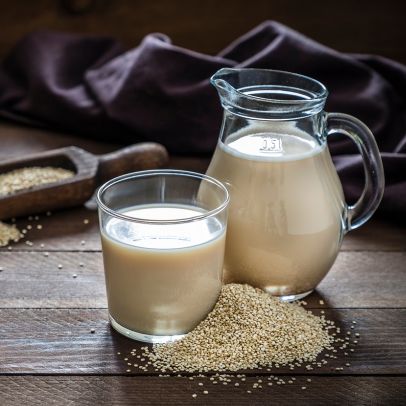
Nutritional Profile:
| Nutrient | Amount per Cup (240ml) |
|---|---|
| Calories | 70-90 kcal |
| Protein | 2-4 g |
| Fat | 1-2 g |
| Carbohydrates | 12-15 g |
| Fibre | 1-2 g |
| Calcium | 20-30% DV |
| Vitamin D | 25% DV |
Role in human nutrition:
High Protein Content:
Quinoa milk contains all essential amino acids, making it a complete protein source.
Maintains Digestive Health:
It is high in fiber, promoting digestive health (10).
Walnut Milk:
Walnut milk, with its deep, earthy flavor, has roots in ancient civilizations where walnuts were a symbol of wisdom. This rich and flavorful milk offers a taste of history while providing a sophisticated option for those seeking a distinctive dairy alternative.
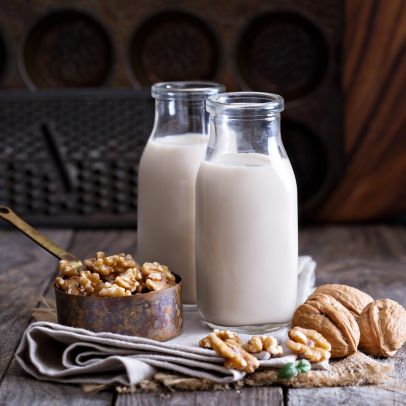
Nutritional Profile:
| Nutrient | Amount per Cup (240ml) |
|---|---|
| Calories | 120-130 kcal |
| Protein | 3-4 g |
| Fat | 10 g |
| Carbohydrates | 2-3 g |
| Fibre | 1-2 g |
| Calcium | 20-30% DV |
| Vitamin D | 25% DV |
| Omega-3 Fatty Acids | 1500 mg |
Role in human nutrition:
Supports Brain Health:
Walnut milk is rich in omega-3 fatty acids, which support brain health.
Improves Heart Health:
Omega-3 fatty acids also benefit heart health (11).
Hazelnut Milk:
Hazelnut milk, known for its sweet, nutty flavor, has been enjoyed since Roman times. This delightful beverage continues to charm with its rich taste and versatility, making it a beloved addition to everything from coffee to desserts.
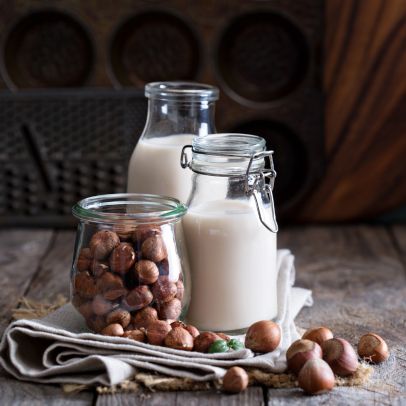
Nutritional Profile:
| Nutrient | Amount per Cup (240ml) |
|---|---|
| Calories | 70-80 kcal |
| Protein | 2-3 g |
| Fat | 5-6 g |
| Carbohydrates | 1-2 g |
| Fibre | 1-2 g |
| Calcium | 20-30% DV |
| Vitamin D | 25% DV |
Role in human nutrition:
Antioxidants:
Hazelnut milk contains antioxidants that support immune function and skin health.
Heart Health:
It is rich in healthy fats, which are beneficial for heart health (12).
Pistachio Milk:
Pistachio milk, made from the vibrant green nuts cherished since ancient Persia, offers a uniquely sweet and nutty flavor. This luxurious milk brings a touch of elegance to the plant-based milk aisle, celebrated for its distinctive taste and rich history.
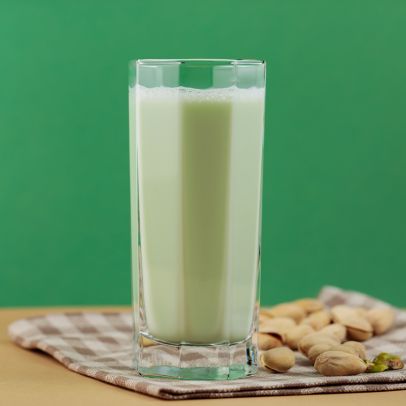
Nutritional Profile:
| Nutrient | Amount per Cup (240ml) |
|---|---|
| Calories | 50-70 kcal |
| Protein | 2-3 g |
| Fat | 4-5 g |
| Carbohydrates | 1-2 g |
| Fibre | 0-1 g |
| Calcium | 20-30% DV |
| Vitamin D | 25% DV |
Role in human nutrition:
Good for Heart Health:
Pistachio milk is rich in monounsaturated fats, which support heart health.
Improves Eye Health:
It contains antioxidants that benefit eye health (13).
Sunflower Seed Milk:
Sunflower seed milk, derived from the seeds of the sunflower plant native to North America, offers a mild and slightly nutty flavor. This innovative milk pays homage to the sunflower’s storied history while providing a fresh and nutritious dairy alternative.

Nutritional Profile:
| Nutrient | Amount per Cup (240ml) |
|---|---|
| Calories | 60-80 kcal |
| Protein | 3-4 g |
| Fat | 5-6 g |
| Carbohydrates | 2-3 g |
| Fibre | 1-2 g |
| Calcium | 20-30% DV |
| Vitamin D | 25% DV |
| Vitamin E | 30% DV |
Role in human nutrition:
Skin Health:
Sunflower seed milk is rich in vitamin E, an antioxidant that supports skin health (14).
Heart Health:
It contains healthy fats that benefit heart health.
Pumpkin Seed Milk:
Pumpkin seed milk, with its earthy and slightly sweet flavour, has roots in Native American cuisine where pumpkin seeds were a dietary staple. This unique milk offers a taste of tradition while providing a novel option for those exploring plant-based beverages.
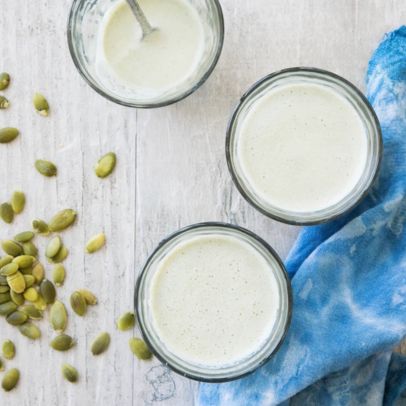
Nutritional Profile:
| Nutrient | Amount per Cup (240ml) |
|---|---|
| Calories | 70-90 kcal |
| Protein | 2-3 g |
| Fat | 4-5 g |
| Carbohydrates | 2-3 g |
| Fibre | 1-2 g |
| Calcium | 20-30% DV |
| Vitamin D | 25% DV |
| Iron | 4-6% DV |
Role in human nutrition:
Immune Support:
Pumpkin seed milk is rich in zinc, which supports immune function.
Heart Health:
It contains healthy fats and antioxidants that benefit heart health (15).
Sesame Seed Milk:
Sesame seed milk, made from seeds that have been cultivated for over 3,000 years, boasts a rich, nutty flavor. Revered in ancient civilizations for their versatility and nutritional value, sesame seeds now offer a creamy and delicious milk alternative.
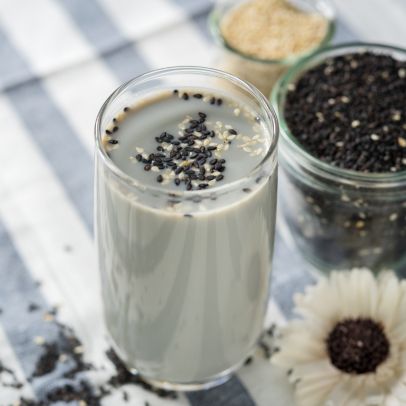
Nutritional Profile:
| Nutrient | Amount per Cup (240ml) |
|---|---|
| Calories | 60-80 kcal |
| Protein | 3-4 g |
| Fat | 5-6 g |
| Carbohydrates | 2-3 g |
| Fibre | 1-2 g |
| Calcium | 20-30% DV |
| Vitamin D | 25% DV |
| Iron | 4-6% DV |
Role in human nutrition:
Bone Health:
Sesame seed milk is high in calcium, supporting bone health.
Antioxidants:
It contains antioxidants that support overall health (16).
Tiger Nut Milk:
Tiger nut milk, also known as horchata de chufa, has been a beloved beverage in Spain since ancient times. Made from the small, tuberous tiger nut, this milk offers a sweet, slightly earthy flavor that has delighted palates for generations.
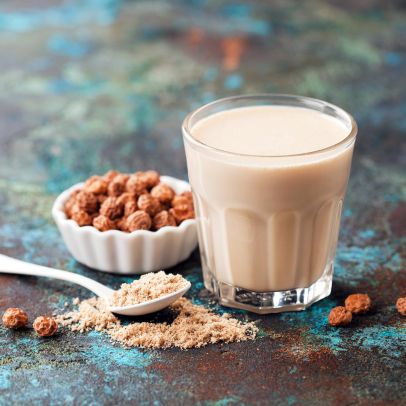
Nutritional Profile:
| Nutrient | Amount per Cup (240ml) |
|---|---|
| Calories | 120-140 kcal |
| Protein | 1-2 g |
| Fat | 7-9 g |
| Carbohydrates | 10-15 g |
| Fibre | 1-2 g |
| Calcium | 20-30% DV |
| Vitamin D | 25% DV |
Role in human nutrition:
Digestive Health:
Tiger nut milk is high in fiber, promoting digestive health.
Heart Health:
It contains healthy fats that benefit heart health (17).
Spelt Milk:
Spelt milk, crafted from the ancient grain spelt, provides a smooth and slightly nutty taste. Celebrated for its historical significance and wholesome flavor, spelt milk offers a unique and nutritious alternative to dairy.

Nutritional Profile:
| Nutrient | Amount per cup (240 ml) |
|---|---|
| Calories | 100-120 kcal |
| Protein | 2-3 g |
| Fat | 2-3 g |
| Carbohydrates | 15-20 g |
| Fibre | 2-3 g |
| Calcium | 20-30% DV |
| Vitamin D | 25% DV |
Role in human nutrition:
Digestive Health:
Spelt milk is high in fiber, promoting digestive health (18).
Energy Source:
It is a good source of complex carbohydrates, providing sustained energy.
Barley Milk:
Barley milk, with its roots in ancient Egyptian and Roman diets, offers a mild and slightly sweet flavor. This milk pays tribute to its rich agricultural history while providing a refreshing and nutritious dairy alternative for modern consumers.
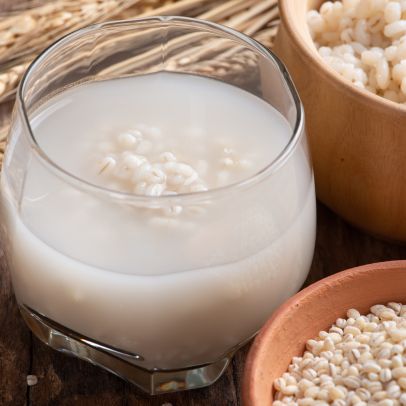
Nutritional Profile:
| Nutrient | Amount per Cup (240ml) |
|---|---|
| Calories | 80-100 kcal |
| Protein | 2-3 g |
| Fat | 1-2 g |
| Carbohydrates | 15-20 g |
| Fibre | 2-3 g |
| Calcium | 20-30% DV |
| Vitamin D | 25% DV |
Role in human nutrition:
Aids in Digestive Health:
Barley milk is high in fiber, promoting digestive health.
Heart Health:
It contains beta-glucans, which help lower cholesterol levels (19).
Choosing the right milk alternative depends on individual dietary needs and health goals. Each plant-based milk offers unique benefits, from almond milk’s low-calorie content to the high protein content of soy milk, fiber-rich oat milk, and allergy-friendly rice milk. Understanding the nutritional profiles and health benefits of these options can help consumers make informed decisions.
References:
- 1. “Nutritional Benefits of Almond Milk.” Healthline, 2023. [Link](https://www.healthline.com/nutrition/almond-milk-benefits)
- 2. “The Benefits of Soy Milk.” WebMD, 2022. [Link](https://www.webmd.com/diet/health-benefits-soy-milk)
- 3. “Coconut Milk Nutrition Facts.” Medical News Today, 2023. [Link](https://www.medicalnewstoday.com/articles/324706)
- 4. “Rice Milk: Is It Good for You?” Healthline, 2023. [Link](https://www.healthline.com/health/rice-milk)
- 5. “Oat Milk: Nutrition, Benefits, and How to Make It.” Healthline, 2023. [Link](https://www.healthline.com/nutrition/oat-milk)
- 6. “The Health Benefits of Hemp Milk.” Medical News Today, 2023. [Link](https://www.medicalnewstoday.com/articles/324768)
- 7. “Flax Milk: Nutrition Facts and Health Benefits.” WebMD, 2022. [Link](https://www.webmd.com/diet/flax-milk-nutrition-benefits)
- 8. “Pea Milk Nutrition Facts and Health Benefits.” Healthline, 2023. [Link](https://www.healthline.com/nutrition/pea-milk)
- 9. “Macadamia Milk: Benefits, Nutrition, and How to Make It.” Healthline, 2023. [Link](https://www.healthline.com/nutrition/macadamia-milk)
- 10. “Quinoa Milk: Nutrition Facts and Health Benefits.” WebMD, 2022. [Link](https://www.webmd.com/diet/quinoa-milk-nutrition)
- 11. “Walnut Milk: Nutrition Facts and Health Benefits.” Healthline, 2023. [Link](https://www.healthline.com/nutrition/walnut-milk)
- 12. “Hazelnut Milk: Benefits and Nutrition.” Medical News Today, 2023. [Link](https://www.medicalnewstoday.com/articles/hazelnut-milk)
- 13. “Pistachio Milk: Nutrition Facts and Health Benefits.” WebMD, 2022. [Link](https://www.webmd.com/diet/pistachio-milk-nutrition)
- 14. “Sunflower Seed Milk: Nutrition and Health Benefits.” Healthline, 2023. [Link](https://www.healthline.com/nutrition/sunflower-seed-milk)
- 15. “Pumpkin Seed Milk: Benefits and Nutrition.” Medical News Today, 2023. [Link](https://www.medicalnewstoday.com/articles/pumpkin-seed-milk)
- 16. “Sesame Seed Milk: Nutrition Facts and Health Benefits.” WebMD, 2022. [Link](https://www.webmd.com/diet/sesame-seed-milk-nutrition)
- 17. “Tiger Nut Milk: Benefits, Nutrition, and How to Make It.” Healthline, 2023. [Link](https://www.healthline.com/nutrition/tiger-nut-milk)
- 18. “Spelt Milk: Nutrition Facts and Health Benefits.” Medical News
- Today, 2023. [Link](https://www.medicalnewstoday.com/articles/spelt-milk)
- 19. “Barley Milk: Nutrition and Health Benefits.” Healthline, 2023. [Link](https://www.healthline.com/nutrition/barley-milk)

